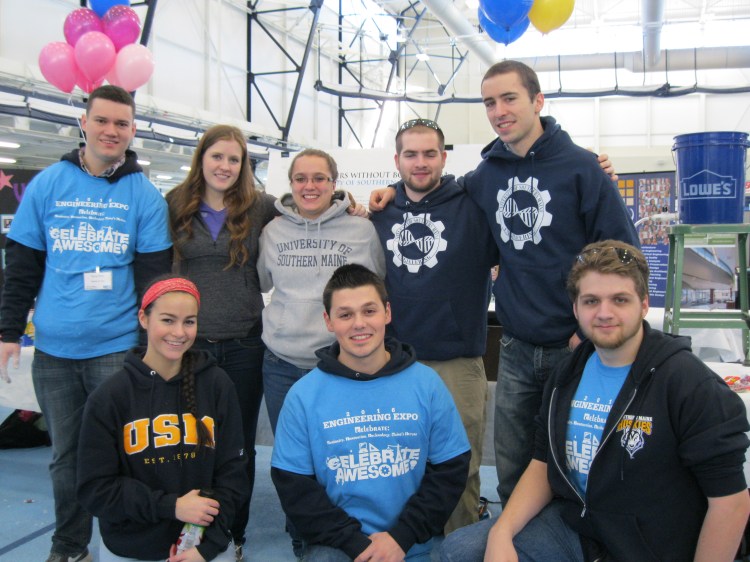
Michaela Demers, a mechanical engineer at Portsmouth Naval Shipyard in Kittery, graduated from the University of Southern Maine, where she was a William B. Wise Scholar Athlete, in 2017. She and two other student-athlete engineering majors founded the “Women in STEM: Science, Technology, Engineering and Mathematics” group.
Here, she discusses the challenges and rewards of her chosen profession.
A BIT OF BACKGROUND

Michaela Demers, in grey sweatshirt, joins in the educational fun at the annual Engineers Week EXPO during her junior year at the University of Southern Maine.
I went to Manchester (N.H) Memorial High School. I played field hockey, basketball and softball. I was a member of the National Honor Society and also on the student council.
When I was a freshman in high school, we were assigned to prepare a resume. We researched topics including how much a college education would cost, how to choose a major, what career we wanted after graduation, etc.
I had actually decided on engineering by that time, at a young age compared to many people. I’ve always liked to build things and to learn how different things work, so engineering was a natural.
SELECTING A SCHOOL
There are a few reasons I chose the University of Southern Maine. I’m a bit of a homebody and didn’t want to be too far from home (Manchester, N.H.); and USM was also a good fit financially.
I toured a few schools, including USM, where I sat down with Dr. (Mariusz) Jankowski, the department head. He gave me a campus tour and introduced me to other engineering professors. It was clear that there would be a lot of personal attention, working one-on-one with the faculty, and that approach was appealing.
I had heard that USM had an excellent engineering program, and my four years there confirmed it. I majored in mechanical engineering and minored in electrical engineering, and graduated in 2017.
It was an added bonus to be recruited to play field hockey. I was primarily a midfielder, but also a utility player – put me anywhere! We had some good seasons, and made it to the Div. III Little semifinals my sophomore year, and the championships my senior year. Our coach emphasized that playing was a good outlet, letting us get our minds off our studies for a bit, then go back to homework and be able to really focus.
ON MENTORS
My first recommendation for prospective students is to find a mentor. I was very lucky to have two awesome mentors through high school and college. They’re both electrical engineers, and I met them when they were coworkers of my mom (her name?) at what is now Eversource Energy.
Thierno Bah helped me with my homework and was always available when I had questions. And Pooja Shah has been a fantastic female engineer mentor. She helped me with any questions I had regarding my classes and career path, and life in general.
It was inspiring to see another woman pursuing a career in a field that traditionally has included far more men. That’s been changing the past few years, but there are still plenty of opportunities for women.
In college, Dr. Lin Lin, Dr. James Smith and Dr. James Masi were key mentors.
KITTERY CONNECTION
USM has an engineering student committee. (I served as its president for a time.) Each month we would host a company to learn about what they do and what they look for in job candidates. A BIW presentation, and Dr. Lin, the wonderful mentor I mentioned, opened my eyes to this type of work, and Portsmouth Naval Shipyard made sense for me because of the Kittery location.
I interned at Kittery one summer, and for part of a USM year, one day a week or during breaks, and it worked really well with the school schedule. I’ve been a full-time employee for two years now.
ON THE JOB
My work as a mechanical engineer at Portsmouth Naval Shipyard mainly involves vibration analysis; I work for the ship silencing branch of the electrical department. It’s a good balance of hands-on tasks and computer-desk work, and usually pretty different day to day; I use a lot of different machinery.
I work directly with 10 or 12 other people, but I’m constantly conferring with workers throughout the shipyard. The collaboration means that communication skills are very important. Overall, I love it here – working with a great group, and meeting new people all the time.
ON A CAREER
Engineering is not the easiest major or path. There’s a lot of homework and hard work, and it can seem a little overwhelming at times.
I would offer new students the same advice that I once received: Get through your college years, and when you’ve graduated, there’s a feeling of genuine accomplishment, and you’ll really appreciate all the hard work you committed to laying the groundwork of a career.
The employment prospects are excellent – there are a lot of options out there. And working in the profession, as I have found at the shipyard, is truly rewarding.
Send questions/comments to the editors.


